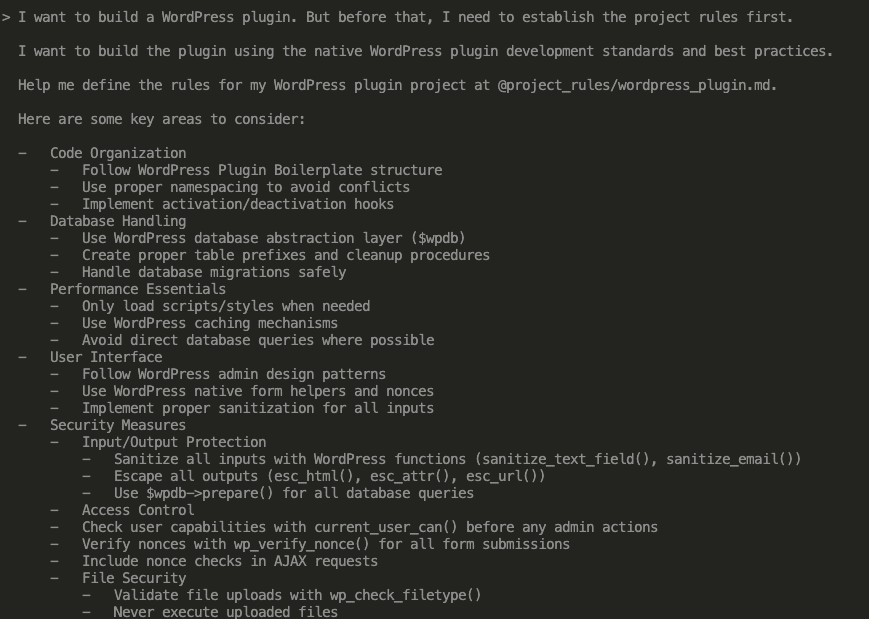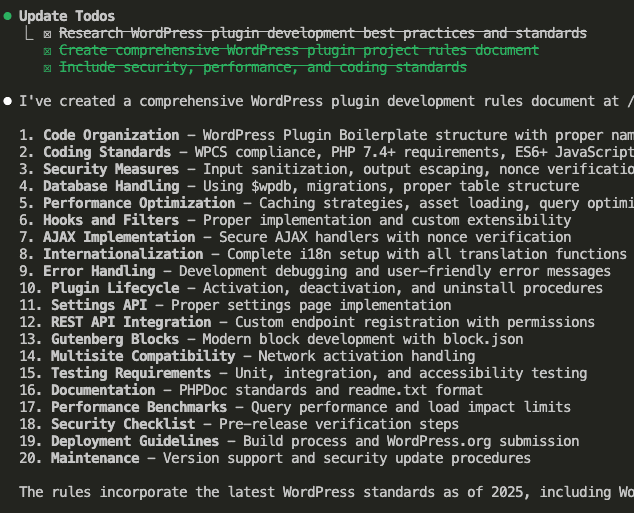How to Build Comprehensive Project Rules with Claude Code
I had the perfect idea for a WordPress plugin.
You know that feeling, right?
The excitement.
The possibilities.
The “this could actually help thousands of people” energy.
I opened Claude Code, ready to describe my vision and watch it come to life.
But then I stopped.
Because I’d learned this lesson the hard way.
Ask Claude Code to “build a WordPress plugin” without clear rules, and you’ll get… something. Maybe it uses outdated PHP patterns. Maybe it ignores WordPress coding standards. Maybe it creates a security nightmare. Maybe it’s perfect – but you won’t know until it’s too late.
“This time will be different,” I told myself. “This time I’ll establish proper development rules first. Then Claude Code will know exactly how to build it right.”
But then the overwhelm hit.
Where do I even start? WordPress coding standards? PHP best practices? Security guidelines? Modern Gutenberg patterns? Performance benchmarks?
I opened a new browser tab. Then another. And another.
Two hours later, I had 47 tabs open, three conflicting tutorials bookmarked, and zero actual rules written.
That’s when I realized I was doing this backwards.
.
.
.
The Traditional Approach (And Why It’s Painful)
Normally, creating project rules looks like this:
- Open 47 browser tabs
- Search for “WordPress best practices 2025”
- Cross-reference official docs
- Copy-paste relevant bits into a document
- Try to organize the chaos
- Realize you missed something important
- Repeat steps 1-6
Hours later, you have a Frankenstein document that’s part outdated tutorial, part Stack Overflow answers, and part wishful thinking.
There has to be a better way.
.
.
.
Enter Claude Code’s Research Mode
Here’s what most people don’t realize about Claude Code:
It’s not just a code generator.
It’s a research assistant with direct access to the web.
When you combine Claude’s ability to:
- Search for current information
- Synthesize multiple sources
- Structure knowledge coherently
- Apply it to your specific context
You get something magical.
.
.
.
My WordPress Plugin Rules Workflow
Step 1: Define What You Need
I started with a simple request in Claude Code:
I want to build a WordPress plugin. But before that, I need to establish the project rules first. I want to build the plugin using the native WordPress plugin development standards and best practices. Help me define the rules for my WordPress plugin project at @project_rules/wordpress_plugin.md.
Then I listed the key areas I wanted covered:
- Code Organization
- Database Handling
- Security Measures
- User Interface
- Error Handling & Logging
- Internationalization
- WordPress Standards Compliance

The key?
Be specific about what matters to YOUR project.
Step 2: Let Claude Research (This Is Where The Magic Happens)
What happened next blew my mind.
Claude didn’t just start writing rules. It went into full research mode.

Over the next few minutes, it:
- Searched for “WordPress Plugin Development Handbook official guidelines 2024”
- Looked up “WordPress 2025 hooks filters best practices security nonces sanitization escaping”
- Researched “WordPress 2025 Gutenberg block editor integration REST API patterns”
- Investigated “WordPress 2025 plugin internationalization i18n accessibility WCAG”
- Found “WordPress.org plugin repository submission requirements 2025”
- Explored “WordPress plugin performance optimization 2025 best practices”
7 comprehensive searches. All automatically.
No tab juggling.
No bookmark organizing.
No getting distracted by unrelated articles.
Join The Art of Vibe Coding—short, practical emails on shipping with AI (without the chaos).
No spam. Unsubscribe anytime. Seriously.
Want techniques like these weekly?
Step 3: Watch It Build Your Rules
After researching, Claude created a complete rules document covering:
- Code Organization – WordPress Plugin Boilerplate structure with proper namespacing
- Coding Standards – WPCS compliance, PHP 7.4+ requirements, ES6+ JavaScript
- Security Measures – Input sanitization, output escaping, nonce verification, SQL injection prevention
- Database Handling – Using $wpdb, migrations, proper table structure
- Performance Optimization – Caching strategies, asset loading, query optimization
- Hooks and Filters – Proper implementation and custom extensibility
- AJAX Implementation – Secure AJAX handlers with nonce verification
- Internationalization – Complete i18n setup with all translation functions
- Error Handling – Development debugging and user-friendly error messages
- Plugin Lifecycle – Activation, deactivation, and uninstall procedures
And 10 more sections I hadn’t even thought to ask for.
Each section wasn’t just theory. It included specific, actionable guidelines:

.
.
.
Pro Tips For Maximum Effectiveness
Tip #1: Be Specific About Your Context
Don’t just say “create rules.”
Specify:
- Your tech stack
- Your team size
- Your deployment target
- Your maintenance plans
Tip #2: Use The Reference Format
Notice how I used @project_rules/wordpress_plugin.md?
This tells Claude exactly where to create the file. No confusion. No “where should I put this?”
Tip #3: Let Claude Research First
Resist the urge to interrupt when you see Claude searching.
Those searches aren’t random. Each one builds on the last, creating comprehensive coverage.
Tip #4: Iterate After Initial Creation
First pass too broad? Ask Claude to focus on specific sections.
Missing something? Request additions.
Too complex? Ask for simplification.
The document is yours to shape.
.
.
.
Real-World Impact
Before this workflow:
- 3-4 hours researching best practices
- Another 2 hours organizing findings
- Probably still missing important standards
- Definitely using some outdated practices
With Claude Code:
- 10 minutes total
- Comprehensive coverage
- Current standards
- Ready to implement
That’s not just time saved. That’s confidence gained.
Now when I finally started building my plugin, I wasn’t guessing. I wasn’t wondering if I was doing things right. I had a comprehensive playbook that covered everything from directory structure to WordPress.org submission requirements.
The plugin idea that almost died in a sea of browser tabs? It’s now a well-architected project with clear standards and best practices baked in from day one.
.
.
.
Your Next Project Rules
Here’s your action plan:
- Identify Your Next Project – What are you building that needs standards?
- List Your Concerns – What aspects worry you? Security? Performance? Compatibility?
- Open Claude Code – Start with “I need to establish project rules for…”
- Be Specific – Include your context, constraints, and requirements
- Let Claude Research – Don’t interrupt the search phase
- Review and Refine – Make it yours
Stop cobbling together rules from random blog posts.
Stop wondering if you’re following current best practices.
Start building with confidence from day one.
What project rules will you create with Claude Code?
P.S. – This same workflow applies to any technology stack. React component standards? API design guidelines? Database schema rules? Claude Code can research and structure them all. The key is asking the right questions and letting Claude do the heavy lifting.
One Comment
-
Steve Palm
•I am guessing that you didn’t include your full prompt as one size doesn’t necessarily fit all, but I would be curious to see the entirety of what you used as the output you listed surely is more comprehensive than what is in that screenshot. 🙂 I’m just starting to look at Claude seriously and this would jumpstart my thought processes.
Leave a Comment